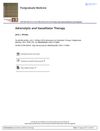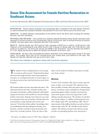 October 1997 in “Baylor University Medical Center Proceedings”
October 1997 in “Baylor University Medical Center Proceedings” Obesity in the U.S. is largely influenced by diet and exercise, certain medications can improve heart procedures and hair growth, and major teaching hospitals have better patient outcomes.
[object Object]  December 2023 in “Health Information Jurnal Penelitian”
December 2023 in “Health Information Jurnal Penelitian” Post-COVID syndrome causes long-lasting symptoms like fatigue, breathing issues, and anxiety.
 70 citations,
December 2004 in “Differentiation”
70 citations,
December 2004 in “Differentiation” The study identified and characterized new keratin genes linked to hair follicles and epithelial tissues.
 1 citations,
May 2001 in “Pharmacology & Toxicology”
1 citations,
May 2001 in “Pharmacology & Toxicology” Cyproterone acetate may cause liver cancer at high doses, but is considered safe at recommended doses for approved uses.

Hair aging leads to color loss and reduced density, and dermatologists are key in treating it to improve quality of life.
 27 citations,
April 2019 in “Journal of The American Academy of Dermatology”
27 citations,
April 2019 in “Journal of The American Academy of Dermatology” Where melanoma is on the body affects survival chances; melanomas on the back of the head are worse, while those on thighs and arms are less severe, and more sun exposure might improve survival.
 January 2024 in “Molecules (Basel. Online)”
January 2024 in “Molecules (Basel. Online)” Juglone from walnut extracts may help repair damaged hair.
 1 citations,
October 1974 in “Postgraduate medicine”
1 citations,
October 1974 in “Postgraduate medicine” New drugs like clonidine and prazosin show promise for treating high blood pressure despite some side effects.
 June 2023 in “International Journal of Research in Dermatology”
June 2023 in “International Journal of Research in Dermatology” Weight loss from bariatric surgery improved certain skin conditions.
 8 citations,
May 2021 in “Reproductive Biology and Endocrinology”
8 citations,
May 2021 in “Reproductive Biology and Endocrinology” Different levels of anti-Müllerian hormone can help diagnose polycystic ovary syndrome in women of different ages.
 June 2011 in “Expert Review of Dermatology”
June 2011 in “Expert Review of Dermatology” Researchers discovered potential origins and new treatments for skin cancer, including biomarkers for melanoma and therapies that reduce tumor growth.
 2 citations,
January 2011 in “Andrologia”
2 citations,
January 2011 in “Andrologia” Flutamide and a new synthetic steroid affected brain and prostate chemicals and showed potential for treating androgen-related conditions and epilepsy.
 3 citations,
October 2010 in “Journal of Experimental & Clinical Medicine”
3 citations,
October 2010 in “Journal of Experimental & Clinical Medicine” Obesity is a major risk factor for insulin resistance in Taiwanese women with PCOS, which is also an independent risk factor for metabolic syndrome.
 March 2021 in “bioRxiv (Cold Spring Harbor Laboratory)”
March 2021 in “bioRxiv (Cold Spring Harbor Laboratory)” A specific immune response helps control mite populations on the skin, maintaining healthy hair follicles.
 51 citations,
May 2013 in “The Journal of Steroid Biochemistry and Molecular Biology”
51 citations,
May 2013 in “The Journal of Steroid Biochemistry and Molecular Biology” Certain drugs that block specific enzymes can help treat prostate diseases.
 16 citations,
March 2000 in “Clinical Biochemistry”
16 citations,
March 2000 in “Clinical Biochemistry” Women with hair loss had higher levels of certain hormones, suggesting a link to a condition like PCOS.
 August 2022 in “IntechOpen eBooks”
August 2022 in “IntechOpen eBooks” Congenital Adrenal Hyperplasia is a rare inherited disease causing hormone imbalances, affecting growth, fertility, and heart health, diagnosed through blood tests and treated with medication and lifestyle changes.
 7 citations,
April 2019 in “The Journal of Steroid Biochemistry and Molecular Biology”
7 citations,
April 2019 in “The Journal of Steroid Biochemistry and Molecular Biology” 11α-Hydroxyprogesterone is changed into different substances by certain enzymes and may play a role in prostate cancer.
 January 2019 in “Paëmi Sino”
January 2019 in “Paëmi Sino” Women with keloid scars often have acne and hair loss, especially those with "true" keloids, indicating a possible hormonal imbalance.
 March 2021 in “Actas Dermo-Sifiliográficas”
March 2021 in “Actas Dermo-Sifiliográficas” The microbiome may be linked to hair loss and could be a target for new treatments.
 5 citations,
March 2018 in “Dermatologic Surgery”
5 citations,
March 2018 in “Dermatologic Surgery” The study found that most donor sites are good for hairline restoration in Southeast Asian women, but hair characteristics should match for a natural look, and aging can reduce hair density and diameter.
 1 citations,
January 2017 in “Przegla̧d dermatologiczny”
1 citations,
January 2017 in “Przegla̧d dermatologiczny” People with more than 11 skin tags, especially on the thigh, neck, or armpit, may have a higher chance of metabolic syndrome.
 80 citations,
August 2002 in “Journal of Dermatology”
80 citations,
August 2002 in “Journal of Dermatology” Best hair growth results from combining finasteride and minoxidil.
 221 citations,
January 2014 in “Human Reproduction”
221 citations,
January 2014 in “Human Reproduction” Adding anti-Müllerian hormone to PCOS criteria lowers the number of women diagnosed.
 40 citations,
December 2019 in “Neurobiology of Stress”
40 citations,
December 2019 in “Neurobiology of Stress” Neuroactive steroids show promise for treating mental and neurological disorders by targeting GABA_A receptors.
 251 citations,
October 2014 in “The Journal of Clinical Endocrinology & Metabolism”
251 citations,
October 2014 in “The Journal of Clinical Endocrinology & Metabolism” The guidelines advise against using testosterone and DHEA in women for most conditions due to safety and effectiveness concerns, but suggest considering testosterone for postmenopausal women with low sexual desire.
 2 citations,
January 1908 in “Journal of the American Medical Association”
2 citations,
January 1908 in “Journal of the American Medical Association” Fear of hair-related issues causes significant mental distress, especially in high-stress women.
[object Object]  106 citations,
April 2010 in “ACS Nano”
106 citations,
April 2010 in “ACS Nano” C60 fullerenes can alter protein function and may help develop new disease inhibitors.
 2 citations,
September 2021 in “JAAD case reports”
2 citations,
September 2021 in “JAAD case reports” Dupilumab helped a woman with severe hair loss regrow her hair quickly and maintain it for six months after stopping treatment.
 24 citations,
September 2001 in “Journal of The American Academy of Dermatology”
24 citations,
September 2001 in “Journal of The American Academy of Dermatology” Women's ovarian hormones and adrenal androgens change throughout life, affecting hair loss and health.






























